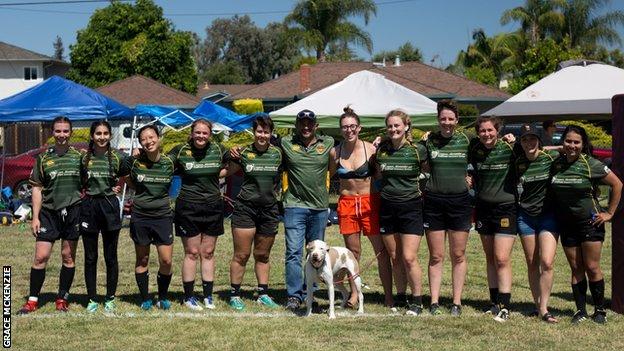Twelve months into her gender transition, Grace McKenzie was recruited out of the blue to join the Golden Gate Women’s rugby club in San Francisco.
McKenzie says playing rugby has given her a platform to “just focus on living and enjoying myself” – but a new proposal to ban trans women from women’s contact rugby could bring that to an end.
Table Of Contents
‘It makes you question if you have a place’
“There’s a lot of rhetoric out there about where trans people fit into sports overall, and it really makes you question whether you have a place, especially as a trans woman playing women’s sports,” McKenzie told BBC Sport.
“I was really certain that team sports were out of the question for me until rugby found me.”
McKenzie, 26, had never picked up a rugby ball before until she was approached at a tech conference, but was soon hooked and says that for the first time in a long time, felt that she belonged. As she embarked on this new stage of her life, the club also provided a safe space from transphobia.
“It’s very taxing to go through that on a daily basis – you begin to live in anticipation and fear of the sorts of things happening,” she said.
“Whereas in rugby, especially when I’m on the field, those things go away. I get to forget about that for a least a short amount of time.”
‘Fear of losing rugby as a community’
Transgender participation in women’s sport is a complex and divisive issue, and McKenzie fears being excluded from competition
World Rugby is considering a proposal to ban transgender athletes from women’s contact rugby due to safety concerns that they say have emerged from recent independent research, claiming there was likely to be “at least a 20-30% greater risk” of injury when a female player is tackled by someone who has gone through male puberty.
Its current rules allow trans women to play as long as they suppress their testosterone levels for at least 12 months, in line with International Olympic Committee policy.
But the governing body has undertaken a “comprehensive review” of that policy, telling BBC Sport in a statement that it was not working.
“The latest peer-reviewed research confirms that a reduction of testosterone does not lead to a proportionate reduction in mass, muscle mass, strength or power,” said the statement.
“These important determinants of injury risk and performance remain significantly elevated after testosterone suppression.
“This presents a clear safety risk when transgender women play women’s contact rugby.”
The draft proposals have been welcomed by some women’s groups who insist women’s sport needs to be protected, and regard the move by World Rugby as a “trailblazing” approach towards the sensitive issue of trans inclusion.
Dr Nicola Williams of women’s rights advocacy group Fair Play for Women attended World Rugby’s transgender workshop in February and has “commended” the governing body for its “bravery and integrity” in tackling the issue.
But Loughborough University medical physicist and trans woman Joanna Harper, who also attended the workshop, did not agree with “an outright ban”.
Trans athletes have also expressed concern, and activists like McKenzie have described it as “a gut punch”.
“I think the fear of losing rugby as a community and supportive space has been weighing on me quite heavily,” said McKenzie. “There isn’t a moment I don’t worry about losing that access.”
If World Rugby’s proposal is upheld, it would be the first international sports federation to prohibit trans women from competing in women’s sport.

What happens next?
A host of other sports organisations also are known to be reviewing their transgender policies and McKenzie fears a ripple effect that would negatively affect trans athletes.
“I worry that other sporting federations will look at World Rugby and begin to second-guess the existing science that supports trans women’s inclusion in sport, and begin to make policies based out of a place of fear instead of a place of logic and reason,” said McKenzie.
World Rugby says it is committed to ensuring trans people remain involved with rugby, will continue “to explore appropriate participation pathways for transgender athletes” and is “funding further research into the safe participation of all players in rugby”.
Non-contact rugby would remain open to all, while the draft proposals recommend that trans men should be allowed to play men’s rugby, provided they have signed a consent form.
McKenzie says it is a “very convenient way to appear to be keeping the sport open” while keeping trans women separate.
“I don’t feel that trans people deserve to just get the leftovers when it comes to these sorts of things,” she added. “I want to be able to participate fully with my team and in the sport that I love.
“I think that there is still a path forward to allow us to do that.”
McKenzie has started a petition to get World Rugby to reconsider, which has gathered 15,000 signatures in two weeks.
The draft proposals are currently out for review and a decision is expected to be made when unions vote at a World Rugby Council meeting in November.
It’s understood that World Rugby would allow individual unions to adapt the guidance to suit local law and amend it at the community level of the game, should they wish to do so.
“I would ask them to think about what it would be like to have something that you love, cared about and that brought meaning and happiness into your life taken away from you, and you had been told that that you weren’t able to access that based on who you are as a person,” said McKenzie.
“Hopefully there is a chance to empathise with our cause and understand what that would be like.”